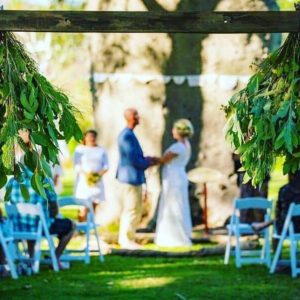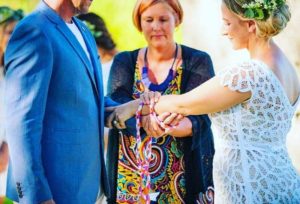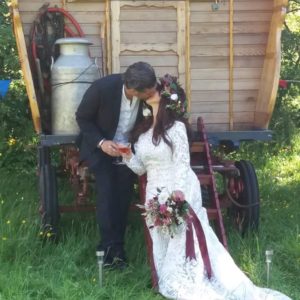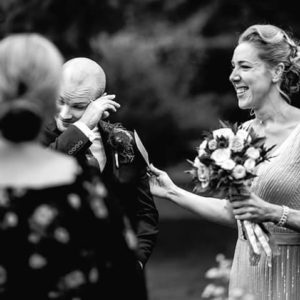With the rise of celebrant-led wedding ceremonies in England, and registrars now offering ‘bespoke’ ceremonies, it’s important for couples to understand the difference between when a celebrant creates a bespoke ceremony and when a registrar offers a bespoke ceremony. Let me say at the outset, they are nothing alike, though you may think for the £850 or so that a registrar may charge you’ll be getting something special.
As a celebrant, I spend an average of 20 hours per wedding couple. This includes getting to know them (face to face or by Skype, depending on if they’re in the country or not), truly understanding their beliefs about life and love and marriage, learning their love story as well as their hopes and dreams for married life, writing their ceremony script, meeting them at the venue before the wedding day, the day of the ceremony, spending hours rehearsing their ceremony so that it flows freely and is ‘off the page’ during the officiating, and travel time. The 20 to 30 minute ceremony I officiate on the day, rests on the foundation of a lot of unseen work.
Bespoke, to me, means that not only do I get to know the couple and build a meaningful relationship with them, but I write a script that is just for them. I am hugely invested in their wedding day, and this shows by the amount of time I spend per couple. In my work, the heart of their ceremony features their love story. Any rituals created are meaningful to them and their beliefs; they’re not simply space fillers or ‘off the shelf’. And just as importantly, I match my energy to theirs.
A registrar doesn’t write a bespoke ceremony for the couple. End of. They use a templated script which was written by a colleague in the office (someone who won’t even meet the couple), and although it allows for the addition of a handfasting, possibly a quaich or sand-blending ceremony (even though registrars aren’t given professional training about handfastings or other rituals), the ritual scripts are templates. The couple must provide their own cord, cup or sand. To be clear, a registrar is not a specialist in rituals.

The bride’s Scottish grandmother offered her silver quaich (Scottish loving cup) for their ceremony at Askham Hall. Photo: Veronika Robinson
With a government ‘bespoke’ template, the couple may write their own vows, and choose readings and music. However, these MUST be approved by the registrar (how bespoke is that?) and must not contain any religious or spiritual elements. Interesting, really, that a handfasting would even be allowed (ditto humanists offering it) given that it has ancient pagan roots and is deeply spiritual.
Inconsistencies abound.

Today is the one-year anniversary of when I officiated Rene and Chantal’s ceremony in Outback Australia.
As an independent celebrant, bespoke to me means the ceremony I create is unique to the couple. If one of them is Catholic and the other Jewish, or maybe one is Pagan and one is atheist, then the ceremony will reflect their beliefs (not mine or that of a government employee). When two people come together, as one, their ceremony needs to accurately reflect this.
A celebrant-led bespoke ceremony is not restricted by government guidelines. A registrar’s ‘bespoke’ ceremony is simply another template with space to pop in some vows written by the couple. There’s no crafting, beauty, care or true personalisation allowed. And there most certainly isn’t recognition or reflection that each human being has beliefs that are unique to them.
To be 100% clear, the registrar taking your ‘bespoke’ ceremony will not have written you a unique script. The words they say aren’t even ones they’ve written themselves. They are, essentially, ‘rent a gob’, to put it crudely. When a skilled celebrant crafts a script, it is done with awareness of pace, pitch and pause; not to mention beauty, flair and creativity. Their script will also accurately reflect their natural vocabulary and the words will flow easily.
The registrar will not have spent hours and hours getting to know you. And they certainly won’t be available to wait around if there’s a delay to your ceremony start e.g. rain or bride held up or some other reason why things haven’t gone to plan. As a matter of course, I don’t book more than one wedding per day. My couples know, with complete certainty, that if there’s any hiccup that might cause a delay, that I am theirs for the day. A registrar, in most cases, has another ceremony to go to and won’t wait for long.
The use of the word ‘bespoke’ by the registration service is, at best, misleading, and at worst, demeaning. It shows a complete misunderstanding of what bespoke means, and short changes a couple of what could be a truly personalised ceremony.







